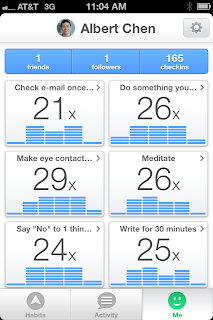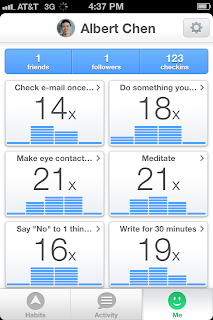It's already time to reflect back on the entire month.
I was healthily hypomanic for the first two weeks. My willpower and confidence was through the roof- I felt like I had the discipline to break through any obstacle. And indeed I did. I easily wrote off thoughts of other's expectations (does X person expect Y from me right now?) and was able to focus on what I thought was most important.
I didn't get much stuff done in lab this past week. Most of what I did do failed. I'm OK with that. I was trying to accomplish a lot before next week's International Worm Meeting in LA, but I think ultimately my brain told me I didn't have enough time to do everything I had planned. My brain felt saturated- by everything I wanted to do, AND everything I thought others expected me to do. I took Thursday off to run some errands and read, and that was easily the best decision of the week.
My time is now constrained- I leave for LA on Wednesday morning, and I still need to make my two posters for the meeting and take care of some obligations. Not to mention do laundry and pack. So I have little doubt that today and tomorrow will be a productivity bonanza.
Then the upcoming Worm Meeting is the perfect chance to incorporate everything I've been working on these past few months- interviewing successful scientists, my first manuscript, practicing eye contact, teaching, literature reading, my current projects, and gathering ideas for the next phase. It has the potential to concretely advance my work in a measurable way. Time to level-up.
_________________________________________________________________________________
Embrace the Cycle
There is a clear cycle at work here. When I started this month, I thought I'd be working hard every week and be relentlessly results-focused the entire time. That's what I had developed my scheduled bursts for. But hard work is NOT the best time to get results.
- Phase I: Perspiration. Work intensely to the point of discomfort. Acquire new skills and try new things. Ignore results.
- Phase II: Rest. Mental distance. Do something else, and don't worry about your work.
- Phase III: Level-up. Concrete progress. Demand results from yourself.
Phase I vs Phase II: Progress takes discomfort and hard work. There's no way around it. But that sort of mental training is impossible to maintain. As biological creatures, we need Phase II- time to rest and let our bodies and thoughts reorganize themselves.
Phase I vs Phase III: One should NOT be results-oriented during the hard training phase. Obsessing over concrete results leads us to take shortcuts and take solace in easy and ultimately unimportant accomplishments, because it is impossible to make meaningful gains on a daily or even weekly basis. Instead of focusing on what you accomplish, focus on how you work. Refine your process and treat it like a craft. Once you have built a solid base, then you can later apply them to getting results.
Phase II vs Phase III: Phase II gives you the time to consolidate your newly acquired capabilities and build up your mental energy for the final push for results. Then, you can tell yourself during Phase III that you WILL do something amazing, and this brings the exhilaration and adrenaline required for a truly meaningful accomplishment.
The entire perspective of this post was inspired by weightlifting. My weekly workouts cycle between intense training, a light workout, and a PR day. Analogies are awesome.
_________________________________________________________________________________
Just because I promised it
No schedule for the upcoming week, since it will be inherently dictated by the Worm Meeting schedule.
 |
| Green blocks are successful scheduled bursts, red blocks are failed, and blue blocks are prior commitments. |




























